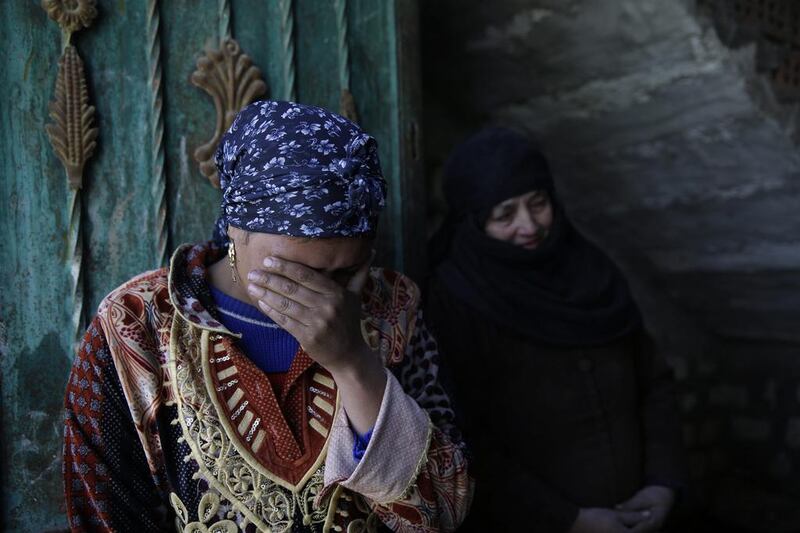GENEVA // With the ritual beheading of 21 Egyptian Christians, ISIL has issued a powerful statement that it regards Libya as the third front in a war already taking place in Iraq and Syria.
The extremist organisation has grown fast in Libya since last summer, taking advantage of the chaos of a civil war raging between two governments, the religiously conservative Libya Dawn in Tripoli and the elected – and internationally recognised – House of Representatives in the eastern city of Tobruk.
Amid the fighting, as in Syria, ISIL has found fertile ground to expand. The first city it captured was Derna, on Libya's eastern coast, which it proclaimed an "Islamic Emirate" last summer. By December, the Pentagon was reporting the existence of ISIL training camps in the eastern mountains, with Libyan and foreign fighters arriving with combat experience gained in Syria.
Opinion in Libya is divided over whether ISIL has picked up fresh recruits, or whether its ranks are being swelled by existing militant organisations.
Ever since the end of Libya's 2011 revolution, militias, most of which follow a hardline interpretation of Islam, have been a powerful presence in the country's fractured political landscape. Some, now part of Libya Dawn, are loyal to the Muslim Brotherhood while others, notably Ansar Al Sharia – blamed by Washington for the killing of its ambassador Chris Stevens in Benghazi in 2012 – are more extreme.
Long before ISIL arrived in Libya, militants had attacked the convoy of the British ambassador, bombed the Algerian and French embassies and kidnapped the Jordanian ambassador. Ansar Al Sharia last year took over large portions of Benghazi, Sirte and Derna. Its units have since been displaced by ISIL or, in many cases, seen fighters switch allegiance.
ISIL made its presence felt earlier this year with the kidnap of the Egyptians, who were migrant workers in Sirte, and sending a three-man suicide squad to attack Tripoli's luxury Corinthian hotel, killing nine people.
This month its fighters rolled into Nawfilya, 65 kilometres from Libya’s Es Sider oil port. At the weekend, it stormed key buildings and radio stations in Sirte, warning Libya Dawn units garrisoned there to leave.
But Derna remains the ISIL hub. Long a centre of Libyan militants, fighters from an earlier generation fought an unsuccessful uprising against Muammar Qaddafi in the 1990s under the umbrella of the Libyan Islamic Fighting Group. Defeated, fighters left for Iraq to battle American-led forces, returning to join Libya’s 2011 Arab Spring revolution.
For some fighters, ISIL is a more attractive banner than Al Qaeda, its bold approach preferred to the gradualist mantra of Al Qaeda’s leaders. As in Iraq and Syria, the result has been an ostentatious display of raw power, goading its enemies to respond.
Photographs of the Egyptian Christians were displayed in the latest edition of the ISIL online magazine, Dabiq, showing them – then still alive – being paraded by the sea shore. The magazine carried the logo, “Major Operations in Libya and Sinai”, taken as a statement of intent about its expanding operations.
It showed something else too: when the Egyptian Christians were first captured, in two operations in December and January, ISIL released a photo montage showing their faces on a black background, an item that appeared to be the work of home-grown volunteers. By this month, ISIL had imposed its media style on the propaganda, showing the men in the familiar orange jump suits, each accompanied by an ISIL fighter dressed in all-black.
Diplomats see this as evidence of the ISIL “franchise” in which a hard core of fighters arrive in a country with pre-agreed plans for action, along with a tightly controlled media arm.
For ISIL leaders, Libya is a tempting prize, the war offering the same chaos and dislocation found in Iraq and Syria. Western leaders worry that Libya offers the one thing not available in either Iraq or Syria – access to the coast. ISIL bases at Derna, Sirte and Nawfilya are all close to the shore offering the chance for units to set sail across the Mediterranean to attack Europe.
ISIL will have expected Egypt’s air strikes and may hope the bombing brings further chaos to an already war-torn country, and with it fresh chances to expand.
foreign.desk@thenational.ae





